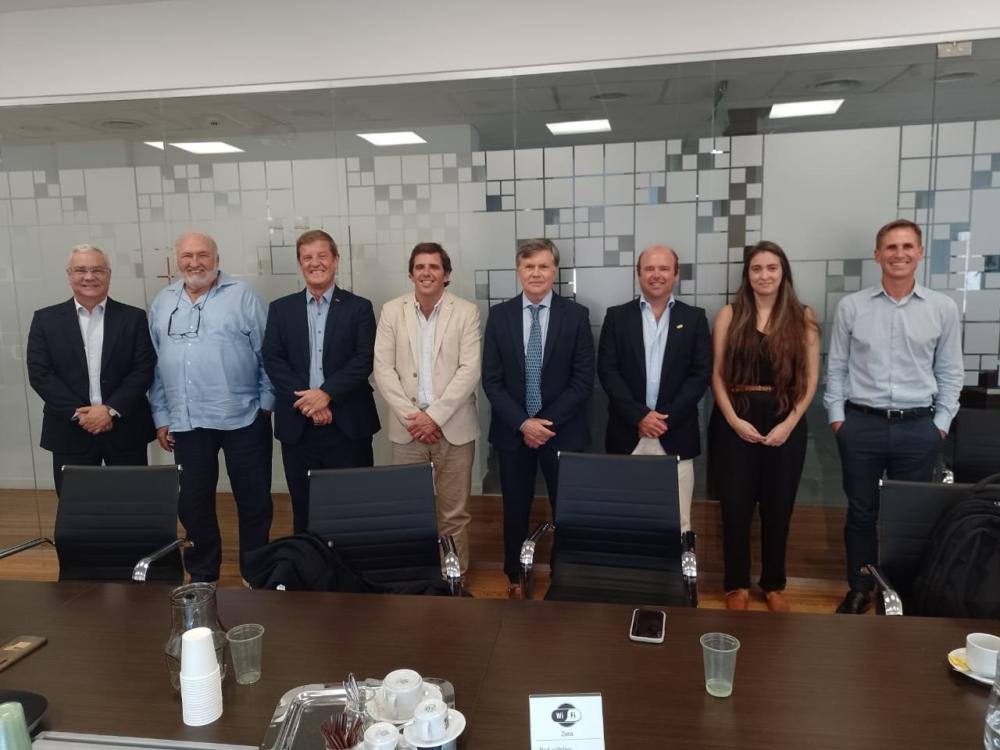Carbon sequestration in pastures and carbon footprint measurement; reduction of greenhouse gas emissions; as well as soil health care were some of the issues that Otero discussed with Secretary Juan José Bahillo.

Buenos Aires, 24 January 2023 (IICA) – The headway that Argentina has made in increasing environmental sustainability in agriculture and the means of sharing these experiences with other countries in the region were the topics of discussion in a meeting between the Secretary of Agriculture, Livestock and Fisheries of the South American country, leading private sector stakeholders and the Director General of the Inter-American Institute for Cooperation on Agriculture, who was visiting the country.
Otero, Secretary Juan José Bahillo, and authorities from the Argentinian Association of Direct Seeding Farmers (AAPRESID) and the Regional Consortia for Agricultural Experimentation (CREA) discussed topics such as carbon sequestration in pastures and carbon footprint measurement; reduction of greenhouse gas emissions; as well as soil health care and crop diversification. The two associations are core groups of agricultural producers, which focus on sustainability and the adoption of best practices to contribute to climate change mitigation and environmental conservation.

The meeting also discussed the need to improve techniques to manage water resources at a time when much of Argentina is experiencing a drought that will severely affect agricultural production in 2023, dealing a major blow to exports and the gross domestic product (GDP) of the country.
Bahillo and Otero exchanged information and perspectives on matters related to mitigation, adaptation and climate change resilience – a phenomenon that has already impacted food production in Argentina and other countries in the hemisphere.
They therefore agreed to collaborate to position agriculture in the Americas as part of the solution to global environmental challenges, in preparation for the next United Nations Climate Change Conference (COP28), which will take place at the end of this year.
In November 2022, IICA established the House of Sustainable Agriculture in the Americas at COP 27 – staging 60 seminars there, which were attended by 12 ministers from the region, farmers and food company representatives. COP27 was held in Egypt and AAPRESID and CREA were among those that delivered presentations to demonstrate the advances made in making agriculture more environmentally friendly.
During the meeting, which took place at the headquarters of the Secretariat of Agriculture of Argentina, Otero briefed Bahillo on the latest results of the Institute’s Living Soils of the Americas program. IICA is undertaking the program in partnership with the Carbon Management and Sequestration Center (CMASC) at Ohio State University, which is managed by renowned scientist and 2020 World Food Prize laureate, Rattan Lal.
The IICA Director General was accompanied to the meeting by Special Advisor to the Director General, Jorge Werthein and the Institute’s Representative in Argentina, Fernando Camargo.

Conservation agriculture
AAPRESID representatives visited the IICA office in Argentina and gave a detailed account of how 90% of agriculture in the country uses direct seeding, which entails planting crops without tilling the soil and is associated with a series of best practices that enable crops to be produced without damaging the soil.
Marcelo Torres, Vice President of the association, explained that AAPRESID members include researchers, advisors and agricultural professionals who promote sustainable production of food, fiber and energy, through soil care and network innovation. He also said that this year AAPRESID was proposing to measure the level of carbon associated with sector activities, both in terms of soil sequestration, as well as the carbon footprint.
“We combine direct seeding with other practices —he said—such as weed management, integral management of nutrients, crop rotation and the use of soil cover. Our aim is to scale up conservation agriculture. We have much to offer to enable producers from other countries to increasingly incorporate these models”.
Also in attendance on behalf of AAPRESID were Tomás Coyos, Coordinating Manager; Florencia Cappiello, Technical Writer; and Cecilia Ginés, Manager of the international division.
Soil carbon sequestration
The meeting with CREA took place at the Buenos Aires office of the association, which also has offices in Bolivia, Paraguay and Uruguay. Santiago Negri, President; Jorge Sáenz Rozas, Vice President; and Cristian Feldkamp, Executive Director, explained that CREA has 2,097 members in Argentina and represents between approximately 7 and 20% of agricultural production in the country, in subsectors such as meat, milk and rice.
Feldkamp was adamant that agricultural production in Argentina can strike a positive balance between carbon emission and sequestration, stating that CREA is going to begin to measure the extent of carbon absorption in the soil to prove it. On the other hand, IICA’s Digital Agriculture Coordinator, Federico Bert, gave details on the Institute’s work in this area, which he defined as a fundamental tool to put agriculture on the path towards greater sustainability.
More information:
Institutional Communication Division.
comunicacion.institucional@iica.int











